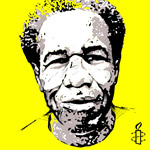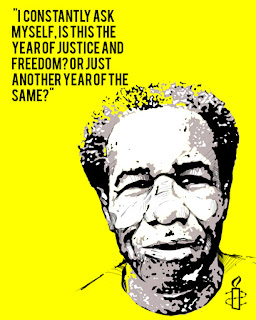A3 Newsletter: Court Rules Albert Woodfox Can Be Retried a Third Time
MEDIA COVERAGE: Esquire: “The Absurdity of Retrial” II Washington Post II NY Times II The Independent (UK) II The Guardian (UK) II Amnesty Intl. UK II Amnesty Intl. USA II The Advocate II teleSUR English II Boston Globe / AP II VICE II Mother Jones II Brennan Center: Will Justice Kennedy Save Albert Woodfox?
PHOTO: A ‘cardboard cutout’ of Albert Woodfox is displayed in downtown London, England during a November 7 protest march organized by Amnesty International UK. If you have not yet done so, please take action by joining Amnesty’s call to “Free Albert Woodfox!”
US 5th Circuit Court Reverses Judge Brady in Bitterly Divided 2-1 Decision
Like Albert, many of you probably awoke to the news that yesterday evening a bitterly divided panel of the 5th Circuit Court of Appeals reversed Judge Brady’s June 8th unconditional Writ ordering his release and barring a retrial.
Albert’s conviction will remain overturned, but there is no longer any doubt that he will be retried a third time by the State of Louisiana, only miles from the solitary cell where he’s spent the bulk of his life.
In a stunning dissent, printed in its entirety below, Judge James Dennis passionately argued against the majority for Albert’s freedom–sharing both Judge Brady’s view of the exceptional injustice represented by this case and his “lack of confidence in the State to provide a fair third trial.”
Though we are disappointed our friend remains in solitary for a crime he didn’t commit, we remain confident that the truth of his innocence and integrity of his struggle for justice will ultimately free him.
The Argument For Freedom
JAMES L. DENNIS, Circuit Judge, dissenting.
“The writ of habeas corpus is the fundamental instrument for safeguarding individual freedom against arbitrary and lawless state action.” Harris v. Nelson, 394 U.S. 286, 290-91 (1969). “Today, as in prior centuries, the writ is a bulwark against convictions that violate ‘fundamental fairness.'” Engle v. Isaac, 456 U.S. 107, 126 (1982). This laudable mission is reflected in Congress’s explicit command that district courts dispose of habeas petitions “as law and justice require.” 28 U.S.C. § 2243.
The Supreme Court has consistently interpreted § 2243’s mandate as vesting district courts with “broad discretion in conditioning a judgment granting habeas relief.” Hilton v. Braunskill, 481 U.S. 770, 775 (1987). Indeed, in interpreting the similarly-worded predecessor to § 2243, the Court explained that the habeas statute endows district courts “‘with the largest power to control and direct the form of judgment to be entered in cases brought up before it on habeas corpus.'” Id. (quoting In re Bonner, 151 U.S. 242, 261 (1894)). As our court and others have thus recognized, this broad power includes the authority “to stop a state criminal proceeding” by barring reprosecution where “exceptional circumstances” exist. Jones v. Cain, 600 F.3d 527, 542 (5th Cir. 2010); see also Satterlee v. Wolfenbarger, 453 F.3d 362, 370 (6th Cir. 2006); Foster v. Lockhart, 9 F.3d 722, 727 (8th Cir. 1993); Capps v. Sullivan, 13 F.3d 350, 352-53 (10th Cir. 1993).
If ever a case justifiably could be considered to present “exceptional circumstances” barring reprosecution, this is that case. For more than four decades, Albert Woodfox has been solitarily confined to a nine-by-six foot cell for 23 hours each day. During the single hour of the day that Woodfox is permitted outside his compact single cell, he also must remain in solitude. At all times, therefore, Woodfox remains in unmitigated isolation-despite being a model prisoner who is now 68 years old and in frail health suffering from an onslaught of life-shortening conditions including heart disease, kidney disease, diabetes, high blood pressure, and a liver ailment that puts him at a high risk for developing cancer. Although the State of Louisiana has subjected Woodfox to these harsh conditions for the 1972 murder of Brent Miller, the State has twice tried and twice failed to obtain a constitutionally valid conviction of Woodfox. In other words, for the vast majority of his life, Woodfox has spent nearly every waking hour in a cramped cell in crushing solitude without a valid conviction to justify what Justice Kennedy recently described as the “terrible price” paid by those suffering “[y]ears on end of near-total isolation.” See Davis v. Ayala, 135 S. Ct. 2187, 2210 (2015) (Kennedy, J., concurring). Yet this unique and alarming aspect of Woodfox’s case is just one in a startling constellation of extraordinary factors militating in favor of barring Woodfox’s reprosecution. See Schuster v. Vincent, 524 F.2d 153, 159 (2d Cir. 1975) (considering the conditions of a habeas petitioner’s confinement as one of various factors supporting an unconditional writ of release).
Because “discrimination on the basis of race in the selection of members of a grand jury . . . strikes at the fundamental values of our judicial system and our society as a whole,” it has been well-settled for more than a hundred years that a criminal conviction cannot stand if it is based on an indictment by a grand jury that excluded individuals on the basis of their race. Rose v. Mitchell, 443 U.S. 545, 556 (1979) (citing Neal v. Delaware, 103 U.S. 370 (1880)). Yet Woodfox was subjected to solitary confinement for almost twenty long years before a state court, after unconscionable delay, finally vacated his first conviction based on the racial discrimination that infected the selection of his first grand jury and his counsel’s failure to attempt to quash the indictment on that basis. By vacating Woodfox’s 1973 conviction for that reason, the state court’s “[1992] decision put the State on notice that [Woodfox] had been grievously wronged, and required it to act with dispatch to correct these wrongs.” See Schuster, 524 F.2d at 161. Although the State was given every opportunity to cure this constitutional defect by reprosecuting Woodfox fairly and free from racially discriminatory procedures, the State failed to do so. Like the selection of the first grand jury, the selection of the second grand jury was also tainted by racial discrimination, thus requiring Woodfox’s second conviction to be vacated-this time in federal court. See Woodfox v. Cain, 772 F.3d 358, 363 (5th Cir. 2014). In the time it took for the State’s repeated error to be acknowledged and corrected, Woodfox was forced to endure another twenty years in the throes of solitary confinement.
Now, more than forty-three years after Miller’s murder took place, the State seeks yet a third opportunity to prosecute Woodfox for the same 1972 crime. In a case we previously characterized as being “built largely on eyewitness testimony,” Woodfox v. Cain, 609 F.3d 774, 784 (5th Cir. 2010), the State’s only purported eyewitness to the murder itself, Hezekiah Brown, died after the first trial. More than a dozen other witnesses are likewise now deceased. This tally includes at least six of Woodfox’s original defense witnesses-two of whom were critical alibi witnesses. In addition to Brown, many of the State’s other most important witnesses to testify against Woodfox are dead, including Paul Fobb and Joseph Richey. Importantly, in the four decades since Brown, Fobb and Richey first testified against Woodfox, critical new evidence has emerged that could have been used to call their testimony into question. For example, Brown was allegedly threatened and induced into testifying against Woodfox; Fobb, who testified that he saw Woodfox leaving the crime scene, was both blind in his right eye and suffered from optical damage in his left eye at the time of the crime as reflected in newly discovered medical records; and Richey was provided a transfer to a largely unrestrictive environment in exchange for his damaging testimony against Woodfox. Notwithstanding the materiality of this new evidence, the deaths of these critical prosecution witnesses will prevent Woodfox from cross examining them during a third trial, and the jury likely will be forced to reach a verdict based almost exclusively on listening to stand-ins reading the decades-old testimony of dead men. See, e.g., Lopez v. Miller, 915 F. Supp. 2d 373, 434-35 (E.D.N.Y. 2013) (considering the death and unavailability of witnesses at any retrial and the inability of petitioner to otherwise obtain “a fair retrial” as a factor weighing in favor of granting an unconditional writ barring reprosecution); D’Ambrosio v. Bagley, 688 F. Supp. 2d 709, 729-30 (N.D. Ohio 2010) (same). In a case that pivots almost exclusively on the credibility of just a few witnesses, the jury will never see those witnesses or observe their demeanor on the stand in a third trial. As for those witnesses who are still alive, memories have inevitably faded in the almost half-century since Miller’s 1972 murder. Morales v. Portuondo, 165 F. Supp. 2d 601, 612 (S.D.N.Y. 2001) (noting one factor weighing in favor of granting unconditional writ barring reprosecution was that available witnesses would “be required to recall events that occurred 14 years ago”). Physical evidence has also been lost.
In addition to these clear barriers in Woodfox’s path to mounting a defense at a third trial forty-three years after the events, the record reflects yet another potential obstacle to securing a fair third trial: the conduct of the State itself. As the district court noted, the State has engaged in “troubling” conduct throughout the history of this case. During Woodfox’s second 1998 trial, for instance, a prosecutor improperly took the stand and vouched for the deceased Brown’s canned testimony. See Woodfox, 609 F.3d at 805 (“[W]e too are troubled by that aspect of [prosecutor] Sinquefield’s testimony wherein he exclaimed how ‘proud’ he was of Hezekiah Brown and that Brown’s testimony ‘took courage.'”). In the present proceedings, the State has continued to deploy troubling tactics by, inter alia, obtaining an arrest warrant for Woodfox prior to the issuance of our court’s mandate and unilaterally transferring him to a parish jail, thereby attempting to “moot” the district court’s authority to release Woodfox in light of our decision affirming the grant of habeas relief. Recently surfaced allegations that the State made inflammatory statements to the third grand jury in order to obtain a third indictment create even greater uncertainty as to Woodfox’s ability to obtain a fair trial in the State’s third prosecution. See, e.g., D’Ambrosio, 688 F. Supp.2d at 728-29 (citing the state’s “inequitable conduct” during the proceedings as one factor weighing in favor of barring reprosecution). Conceivably, these myriad prejudices to Woodfox in any third trial might be easier to swallow if there were strong evidence of his guilt, but the evidence against him is, at the very best, extremely equivocal. Although there was an abundance of physical evidence available at the crime scene, none of this evidence incriminated Woodfox, and other evidence has emerged since the first trial that casts even further doubt on the State’s case against him. See Morales, 165 F. Supp. 2d at 609 (citing the “extremely thin” evidence against petitioners as an additional factor weighing in favor of granting an unconditional writ barring reprosecution).
Given the totality of these indisputably “exceptional” circumstances, I cannot say that the district court abused its “broad discretion” under 28 U.S.C. § 2243, Hilton, 481 U.S. at 775, in concluding that “law and justice require” a habeas remedy that bars the State from prosecuting Woodfox for a third time. See Jones, 600 F.3d at 542 (observing that in “exceptional circumstances” a district court may “exercise its habeas corpus power to stop a state criminal proceeding”). In reaching the opposite conclusion, the majority not only fails to give the district court “the deference that is the hallmark of abuse-of-discretion review,” General Elec. Co. v. Joiner, 522 U.S. 136, 143 (1997), but also ignores that “[t]he very nature of the writ [of habeas corpus] demands that it be administered with the initiative and flexibility essential to insure that miscarriages of justice within its reach are surfaced and corrected,” Harris, 394 U.S. at 291. Clearly, the wrongful harm done to Woodfox, not only as a litigant but also as a human being by his two unconstitutional convictions and his egregious four decades of solitary confinement, cannot be rectified by the usual remedy of reversal and reprosecution. If the ends of “law and justice” set forth in 28 U.S.C. § 2243 do not justify the district court’s unconditional writ barring Woodfox’s reprosecution, then the Great Writ is but a hollow remedy in this case.
For these reasons, I respectfully dissent.
Write Albert:
Albert Woodfox #72148
West Feliciana Parish Detention Center
PO Box 2727
St. Francisville, LA 70775






